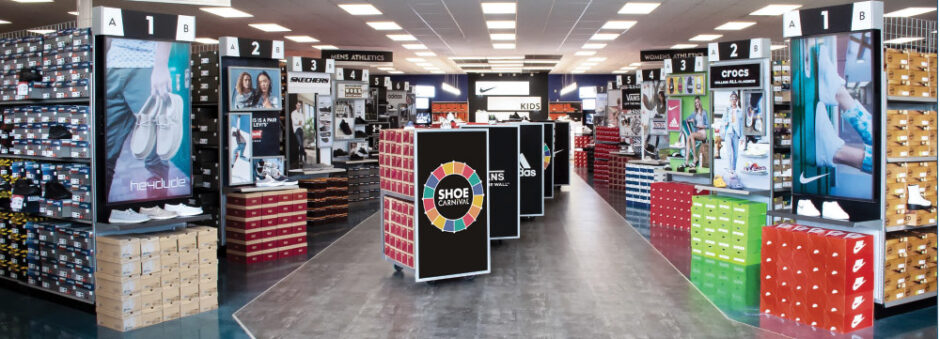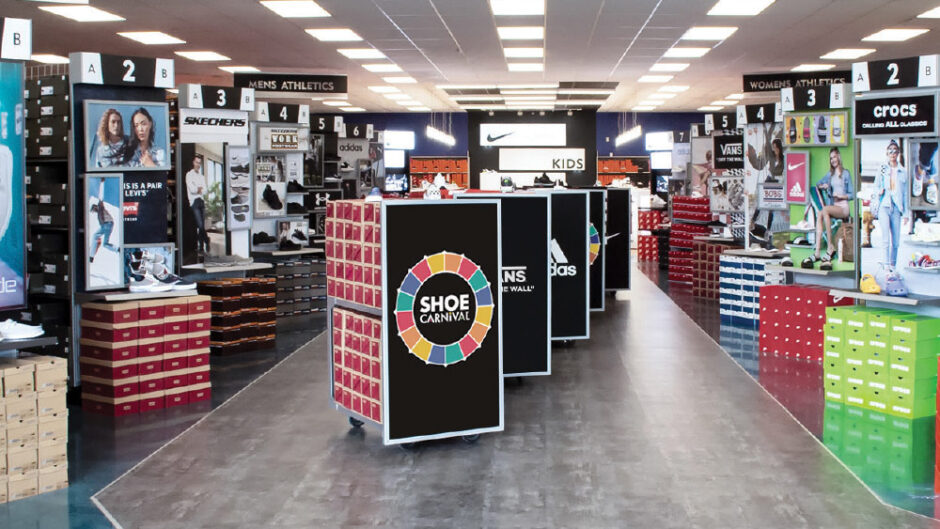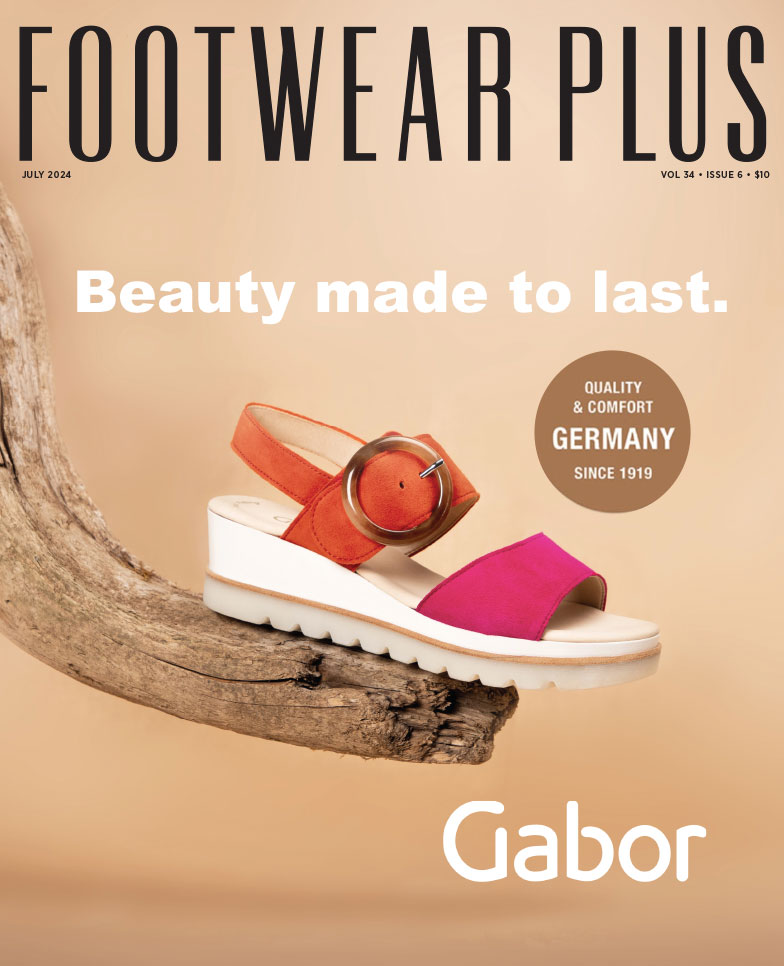 Shoe Carnival recently wrapped up the best fiscal quarter in its 43-year history. And the family footwear chain didn’t just beat it, it crushed it. Takes these stellar stats: Highest quarterly net sales ever of $356.3 million and a 29.8 percent spike over Q3 2020. Record net income of $46.8 million. Record gross profit of $144.1 million. Shoe Perks customer loyalty program increase of more than 10 percent and total membership now over 28.5 million. Store traffic up 40 percent and all comparable stores generating a positive cash flow year to date. A forecast for record Q4 sales. Last but not all, crossing the $1 billion sales mark for the first time ever in three quarters fueled by sales growth of more than $300 million during that stretch.
Shoe Carnival recently wrapped up the best fiscal quarter in its 43-year history. And the family footwear chain didn’t just beat it, it crushed it. Takes these stellar stats: Highest quarterly net sales ever of $356.3 million and a 29.8 percent spike over Q3 2020. Record net income of $46.8 million. Record gross profit of $144.1 million. Shoe Perks customer loyalty program increase of more than 10 percent and total membership now over 28.5 million. Store traffic up 40 percent and all comparable stores generating a positive cash flow year to date. A forecast for record Q4 sales. Last but not all, crossing the $1 billion sales mark for the first time ever in three quarters fueled by sales growth of more than $300 million during that stretch.
The figures would be impressive in normal times, but this happened amid a pandemic that triggered massive disruption in the shoe industry and broader economy. Yet Shoe Carnival is thriving. The company has scored double-digit sales growth since 2018. And the chain is aggressively executing its plans to grow by leaps and billions over the next decade. A pandemic on the heels of the retail apocalypse hasn’t cast a shadow on Shoe Carnival. The future from where the 377-store Evansville, IN-based chain sits appears quite bright. It’s one Mark Worden, president and CEO, believes will be led by brick-and-mortar formats, no less. (Its recent $67 million purchase and bullish expansion plans for the 21-store Shoe Station, a Southeastern-based comfort chain, serves as the most recent evidence.) Indeed, Worden says Shoe Carnival’s act is only just getting started.
“I see us in the middle of a long-term customer trend playing out right now,” Worden says. “We’re still in the early days of it, but we see the customer shifting away from footwear purchases in enclosed malls, in department stores and away from lower-value chains like Payless Shoes. This customer is rapidly migrating into open-air, value shopping centers where we predominantly play.” Worden adds, “Our traffic and customer metrics are surging, and combine that with our strong financial position, we think we’re poised for very big growth ahead.”
Did Shoe Carnival really expect 2021 to be the best in the company’s history? Worden says it wasn’t a complete surprise. “We came into 2021 investing for growth,” he says, citing the company’s long-term growth strategy launched in 2018/19. While 2020 certainly disrupted that trajectory, the wheels were already in motion and being driven by a modern store redesign and aggressive customer engagement efforts. In addition, Shoe Carnival essentially doubled down on the resiliency of American shoppers. “We had confidence in the American consumer, as well as confidence in our vendors and our merchants to buy the right goods,” Worden says. “And we invested in marketing and inventory, and we prepared for those customers to get back to purchasing once our stores reopened.”
The shoe business, in this regard, has an ace up its sleeve. Shoes wear out, and kids’ feet grow fast, regardless of a pandemic. “We remained confident in the necessity nature of our category—it gets cold and snowy and you need boots, it gets hot and you need sandals. And we invested for growth, and it came,” Worden says. “We were absolutely ready: every season, every quarter and every month of 2021. And we prepared our omnichannel capabilities, so customers had the choice to shop wherever they wanted.”
In addition to being well-prepared, David Kahan, CEO of Birkenstock Americas, says Shoe Carnival never panicked. “Like everyone, they faced the exact same uncertainty and chaos, but they maintained their full staff, stock levels and flow of inventory,” he says. “In a time of crisis, they were thinking of opportunities, and that I believe yielded them excellent vendor support which, in turn, creates brand opportunities.”
Sam Poser, senior equity analyst footwear and apparel for Williams Trading, agrees that Shoe Carnival was poised to pounce after the lockdowns and on into 2021. He cites big upgrades in its CRM efforts as a key factor, in addition to not furloughing a single employee. That, Poser says, gave Shoe Carnival a huge head start on the competition once stores reopened. “They kept in communication with their customers, they had people of knowledge in the stores doing curbside pickup and all the other things that needed to be done,” he says. “They gained a ton of new customers through those efforts as well as through their omnichannel. And they kept in touch with vendors far more smoothly than many others did, which gave them much more information on what their customers actually wanted. They were using all the customer-facing data to better assort their stores and to gain to new consumers.” Poser adds, “Customers who may never have thought about shopping at Shoe Carnival in 2019 were being engaged better, and once they came in, Shoe Carnival has been retaining them because of the improved experience.”
Redesign Raves

and CEO, Shoe Carnival
Worden believes customers walking into newly designed Shoe Carnival stores like what they see—starting with no carpeting. (That’s so early aughts.) “We’ve taken inspiration from the best retailers from around the world that have moved towards a more contemporary, polished, hard surface floors and digital signage aesthetic,” he says, adding that it’s all about engaging customers in an entertaining way. “Whether that’s a chance to shoot baskets with your kids at our basketball hoop, spinning our digital wheel to win prizes and promotions or benefiting from the digital shopping technology incorporated throughout the store, we’ve reached the level where the brains and the aesthetics elevate our stores to industry leading or tied with the best.” Worden adds, “We’ve zoomed from a 2005-type store experience to a 2030 readiness.”
The makeover is a must in today’s uber-competitive landscape, Worden believes. “Why get off your phone if it’s not worth driving there?” he says. “As a bricks-first retailer, we believe investing in that brand experience so families can have a moment of joy while shopping for shoes.” Worden adds, “Shoe shopping can be a fun social occasion. It’s buying that next pair of athletic shoes to be healthy, or dress shoes for a date night.” Worden says that desire for such purchases, especially after the past two years, is exploding. “To get out there and do stuff that’s safe, fun and affordable…We fit that need perfectly.”
In addition to an entertaining environment, Worden cites Shoe Carnival’s stand-alone, value shopping strip center locations as another strong draw—even more so since the onset of the pandemic. “It’s a lot more convenient to pop into our stores in an open-air center, and because of Covid not every customer feels comfortable shopping in malls,” he says. The fact many department stores are struggling and their (lack of) service are also playing into Shoe Carnival’s hands. “Customers have been shifting away from malls and department stores that were once dominant in many footwear categories, and they’re liking the styles, brands and shopping experience that we offer,” Worden says.
John Breuninger, a retail analyst for AlixPartners, a consulting firm, agrees that while growing Covid fatigue coupled with vaccines and a weaker Omicron variant has consumers increasingly emboldened to venture out in search of social normalcy, there’s still a fear of enclosed malls. “Making a quick stop at the local strip mall—particularly an open-air format—might be perceived as safer than exploring deep within a cavernous shopping mall with denser concentrations of people and less air circulation,” he says. “Also, strip centers, with their general merchandise and home/electronics anchors, tend to drive more family shopping trips.”
Of course, none of the bells and whistles matters if the merchandise selection is lacking. And that’s another area where Shoe Carnival continues to hit it out of the park—even in the face of epic supply chain headwinds. While Worden says the chain is not completely immune to inventory issues, he is proud that the company entered this year with more product per store and more product overall than at the beginning of 2021. “We had enough inventory for us to deliver record Q3 results, and we’re forecasting Q4 sales to be the strongest in the company’s history with enough products on hand,” he confirms.
How is that possible amid Asian factory shutdowns and the armada of container ships anchored off California? Worden credits the strength of Shoe Carnival’s merchant and vendor partnerships for keeping shelves stocked. “If something is going to be late, we get creative and try to figure out how to get it swiftly—through a port, on a truck, a rail, whatever it takes—to ensure our customers can shop our vendors when they are looking for it,” he says. “Because of those tight relationships and get-it-done spirit, we’re getting it done.”
People Power
None of Shoe Carnival’s recent success—or any potential future gains—happens without its 5,000 to 6,000 employees, depending on the season, according to Worden. They are our “secret sauce” and difference maker. “That’s why we put customer experience, retention and training so high on our prioritization,” he says. “Those that skip such simple executions are going to stub their toe, or maybe not make it. The competition is too tough.”
It’s also why Worden says employee training and retention are critical areas of focus, especially amid the Great Realization. “We believe in providing our workers higher average hourly rates, and we’ve been on a multi-year journey to increase those rates to attract the best people,” he says. “We also believe people need time off, and we offer very generous levels for our store employees. Lastly, we offer a pretty robust benefits program.”
Worden ranks employee hiring and retention as concerns that can keep him up at night. (Another is supply chain challenges.) “The labor market has probably never been tighter, so we’re investing in programs to differentiate ourselves with work environments that employees enjoy and ultimately are career paths that they can grow with a growth retailer,” he says. “We take great pride in our training, development and ability to keep our people loyal.” In that regard, all Shoe Carnival general managers are homegrown, and the company’s employee tenure leads the industry.
Shoe Carnival’s commitment to its employees was perhaps best reflected when management decided not to furlough a single employee after the pandemic hit, even though the financial risks were huge. “That was a big, bold decision when we didn’t have s cash flowing in,” Worden says. “But we thought it was just the right thing to do as human beings—to be there for our 5,000-plus employees during that unknown time and keep them with a wage.”
That investment has paid huge dividends. Not only did Shoe Carnival get a massive head start on the competition when stores reopened, it has also generated a tremendous amount of employee loyalty. “In hindsight, the decision to stand with our people and to continue to employ them was probably the best decision of the entire pandemic so far,” Worden says.
The second-best decision? Not cancelling orders, according to Worden. And that goes beyond the obvious foresight that customers would eventually need new shoes. The decision to keep orders was also about Shoe Carnival not turning its back on its vendors in a time of great need. “We didn’t want to leave our vendors in the lurch—that’s just not good business,” Worden says. “It’s a true partnership. Otherwise, it’s just transactional.”
A third key decision? To continue focusing on retail, period. Shoe Carnival’s direct competitors can’t claim that. “Getting into manufacturing is not in our strategic plan,” he says. “We don’t have any interest in having those complexities.” That retail focus could expand beyond shoe formats in the years ahead. “We’re open to growth close-in or a little further away, but what we’re not open to is moving away from our core strength of retail,” he says. “We believe we’re experts at retail, we love retail and it’s all we want to do.”
That’s music to many vendors’ ears. “That makes them a great partner,” Kahan says. “Retail is all they do, and they have a talented team that’s hyper-focused market by market and door by door precision to achieve the best results.”
Worden believes being a partner and not a competitor means everyone is on the same page. “We have that shared perspective of treating brands as they want to be represented, as well as providing customers experiences with the best brands,” he says.
It’s a retail formula that AlixPartners’ Breuninger believes has legs, particularly Shoe Carnival. “With inflation at the highest levels since 1982, customers are likely to be price-sensitive and value-seeking,” he says, adding that the threat of inflation is unlikely to disappear soon. “Also, the family footwear segment lends itself well to a treasure hunt mentality among consumers. The search is for items that check the right boxes on style, brand and price, and that search is often easier—and more fun for kids—in a physical shopping environment.”
Worden believes Shoe Carnival offers the complete shoe shopping package. “We have the portfolio, price and service that you might have seen at a department store 20 years ago,” he says. “Customer can see at Shoe Carnival—and now at Shoe Station—that we’re singularly focused on offering the broadest and best assortment, at the right price, with an outstanding experience and service. Who wouldn’t want to go there?”
First Stop: Shoe Station
The specialty comfort chain acquisition is the first of potentially many.
The decision to acquire Shoe Station, a comfort chain of 21 stores scattered in the Southeast, involved several attractive qualities, according to Mark Worden, CEO of Shoe Carnival. “First, Shoe Station is a destination shopping experience,” he says. “They’re high traffic—some of the highest I’ve seen in retail.” Worden adds that their customer loyalty is also exceptional, and its stores don’t rely on co-tenancies. “That’s a powerful business model,” he says.
Also key for Shoe Carnival: Shoe Station is a complimentary demographic. “Shoe Carnival does very well in household incomes of $50K-$70K and below, whereas Shoe Station does incredibly well with that range and above,” Worden says. “We can expand across demographics with this destination format. It’s a very exciting complimentary model.”
David Kahan, CEO of Birkenstock Americas, sees the acquisition as a good fit where two well-run parties will both benefit. “Well-managed enterprises coming together to share market insights and great locations…it’s a simple way to make one plus one equal three,” he says. Sam Poser, senior equity analyst footwear and apparel for Williams Trading, adds that the deal gives investors confidence that more such growth is on the horizon. “Mark is going to be more aggressive in opening stores, especially as they now have the data to open far more successful stores than they were able to five or 10 years ago,” he says. “There’s also more real estate available for the size of Shoe Station stores.”
Worden confirms that Shoe Carnival will “absolutely” be opening more doors. “We’re in a growth era now,” he says. “But it’s not limited to just Shoe Station. We’re looking at national retailers too, as our strategic plan over the next decade is to become a multi-billion-dollar retailer that’s both organic and M&A in scope.”
The initial expansion focus will be Shoe Station, and in the Southeast first. Worden projects double-digit annual store growth over the next three to five years—either from scratch or acquisitions converted to the Shoe Station banner. Overseeing that growth is the chain’s former president and CEO, Brent Barkin, who is now
Shoe Carnival’s senior vice president of New Business Development and Integration. “Brent will go market by market in concentric circles and decide whether we’re better off doing it from the ground up or through acquisition,” Worden says, noting that the chain is primed for growth backed by Shoe Carnival’s industry-leading CRM programs, ecommerce platforms and human resource practices. “Shoe Station just needed a partner to provide the infrastructure, balance sheet and capital to take it to a much larger footprint,” he says. “Now they can just focus on trends and growing the business.” —G.D.




